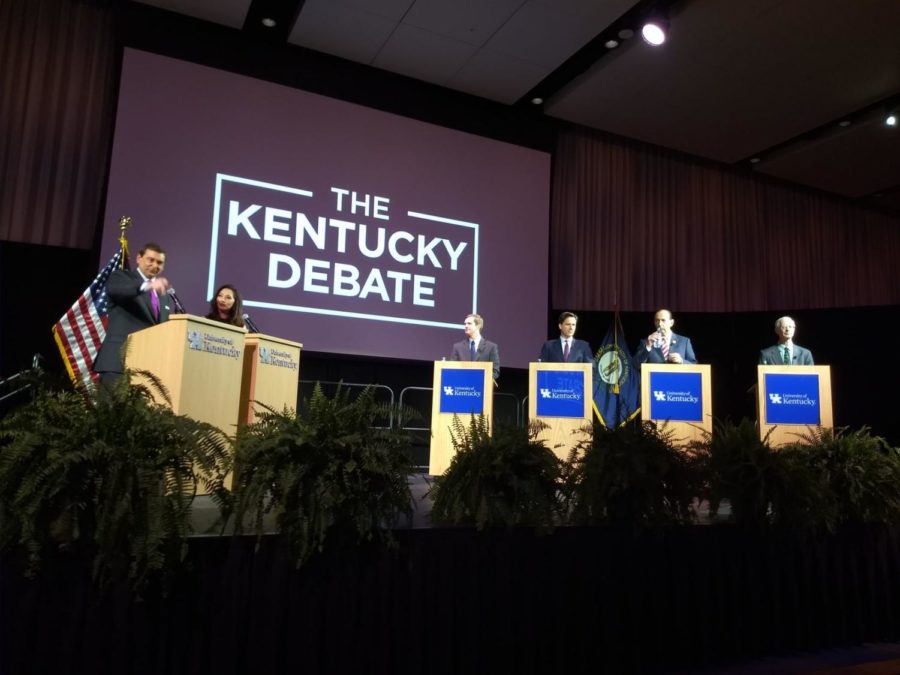Democratic candidates for governor debate at UK ahead of May primary
The Democratic candidates for governor debate at the University of Kentucky ahead of the year’s May primary elections.
May 16, 2019
The Democratic candidates for governor visited UK this week to debate questions from students and make appeals to voters ahead of the primaries.
On Wednesday, just under a week before Kentucky’s gubernatorial primary election day – UK hosted “The Kentucky Debate” in the Gatton Student Center.
The forum was co-hosted by Gray Television, UK’s Student Government Association and the League of Women Voters of Kentucky. Before the debate, SGA vice president Katherine Speece addressed the attendees, many of who were students, and introduced the candidates.
House Minority Floor Leader Rocky Adkins, Kentucky Attorney General Andy Beshear, former Auditor Adam Edelen and long-time repeat candidate Geoff Young all attended.
The four candidates discussed several issues during the panel, which was moderated by WAVE 3 anchor Shannon Cogan and WKYT political editor Bill Bryant.
Topics included school safety, higher education funding and medical marijuana legalization.
The first student-submitted question asked candidates to propose solutions for school security in the wake of recent shootings, both nationwide and in Kentucky.
Adkins emphasized the importance of Republicans and Democrats working together on the issue. He also mentioned his support for the recent school safety bill, which mandates the creation of a security officer in all schools.
He referred to the bipartisan bill as “a foundation” for further school safety legislation.
“There needs to be flexibility that we can build on this bill in the future,” Adkins said. “…for schools to implement the plans that they want… whether it’s metal detectors, whether it’s cameras, whether it’s trained officers, whether it’s mental health counselors – whatever it may be.”
Both Beshear and Edelen agreed with Adkins that school districts should have the opportunity to create specific plans to fit safety needs.
Edelen said “we are asking far too much” of teachers and “funding far too little” when it comes to school safety.
“This is about empowering leaders in local communities to make decisions that will be funded by Frankfort that best serve their community,” Edelen said. “When we do that, when we trust teachers and trust administrators, when we facilitate coordination with law enforcement agencies, we can create locally sourced solutions that work for the communities.”
The other question submitted by students involved higher education funding.
Kentucky is one of the only states to have continually decreased higher education funding since 2008. For many universities, this has led to regular increases in tuition and greater debt for hundreds of students.
Beshear said he would fight tuition increases from public universities and for-profit colleges by funding higher education. He cited former lawsuits he’d filed against Sullivan University and Governor Matt Bevin as proof of his conviction.
“I’m telling you: I value public education and higher education,” Beshear said. “We will fund it in a way you haven’t seen in the past decade. But we will also make demands, because while I wanna provide more money to our public universities and community colleges, we’re gonna demand that it go to lowering tuition. That’s something our students deserve.”
Edelen referred to increasing tuition prices as “a tax on hope” and suggested that state budgets for higher education should be increased.
“When we have priced higher education outside the reach of the working and middle classes, not only have we made an immoral statement about who and what we are, we have signed our economic suicide note,” Edelen said.
Adkins agreed that higher education required more funding and said he was committed to providing those funds.
During the debate, discussion frequently turned to healthcare and the opioid crisis. All candidates suggested that legalizing medical marijuana is a viable option for patients in Kentucky.
Beshear mentioned that he is the first Kentucky Attorney General to support the legalization of medicinal marijuana. He said his position comes from experience with those who have lost family or friends to “fatal overdoses.”
“We lose 30 Kentuckians a week,” Beshear said. “I’m the dad of an eight- and nine-year-old. When I think of 30 Kentuckians, I think of their class, which is right under 30.”
“[The opioid epidemic] is tearing our families apart,” Beshear added. “What medicinal marijuana can do is help chronic pain patients, because opioids do not work for chronic pain.”
Adkins called on personal experience to justify his stance on medical marijuana legalization.
“I stand on this stage as a 24-year cancer survivor,” Adkins said. “I support (the legalization of medical marijuana) because of the relief that it brings to those who are suffering from illness or chronic pain… That should be the top priority.”
Edelen agreed with Beshear and Adkins but went further to suggest that “small amounts” of recreational marijuana should also be decriminalized.
Young said he supported complete legalization for marijuana, both medical and recreational.
During his discussion of marijuana legalization, Young also asked Beshear and Edelen to drop out of the race, suggesting that “a crook has no chance against Matt Bevin in November.”
To the request, Beshear said, “I’ve beat Matt Bevin time and time again, and I’ll do it again in November.”
Edelen said to Young: “Bless his heart.”
A similar on-campus debate was originally planned for the Republican primary candidates. The debate was cancelled following Governor Matt Bevin and Representative Robert Goforth’s decision not to attend.
The Republican Party of Kentucky published an official response via Twitter after Wednesday’s debate.
“Over and over again, the Democratic candidates for governor just regurgitate the same failed policies of their leaders in Washington, DC – like Nancy Pelosi, Hillary Clinton and Barack Obama,” party spokesperson Mike Lonergan said. “These Democrat candidates all want to turn back the clock on the momentum Kentucky has under Republican leadership.”
The debate was aired live from 3 to 4 p.m. on WAVE and WKYT. It can be viewed in its entirety here.
































































































































































